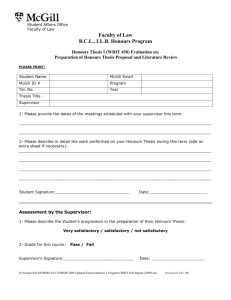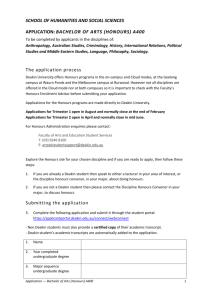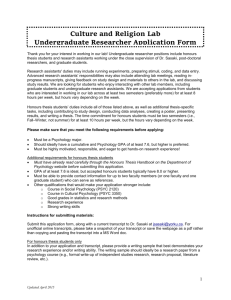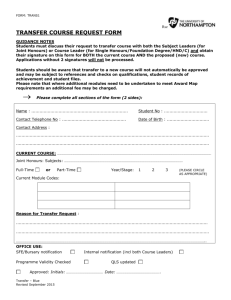a400 bachelor of arts (honours)
advertisement
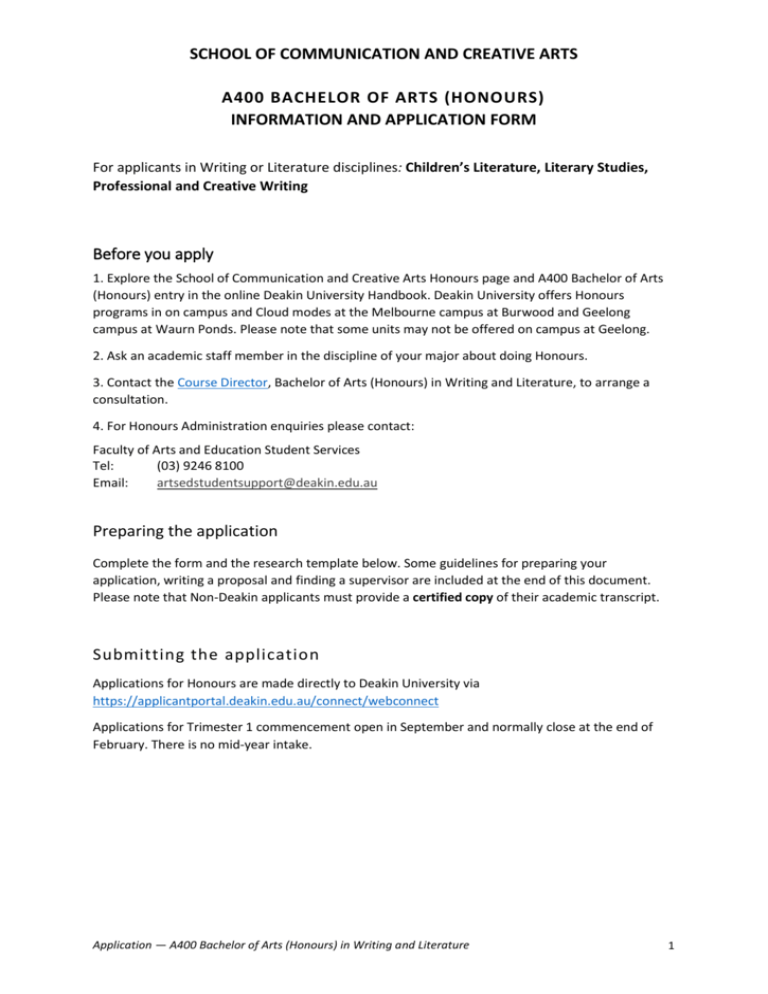
SCHOOL OF COMMUNICATION AND CREATIVE ARTS A400 BACHELOR OF ARTS (HONOURS) INFORMATION AND APPLICATION FORM For applicants in Writing or Literature disciplines: Children’s Literature, Literary Studies, Professional and Creative Writing Before you apply 1. Explore the School of Communication and Creative Arts Honours page and A400 Bachelor of Arts (Honours) entry in the online Deakin University Handbook. Deakin University offers Honours programs in on campus and Cloud modes at the Melbourne campus at Burwood and Geelong campus at Waurn Ponds. Please note that some units may not be offered on campus at Geelong. 2. Ask an academic staff member in the discipline of your major about doing Honours. 3. Contact the Course Director, Bachelor of Arts (Honours) in Writing and Literature, to arrange a consultation. 4. For Honours Administration enquiries please contact: Faculty of Arts and Education Student Services Tel: (03) 9246 8100 Email: artsedstudentsupport@deakin.edu.au Preparing the application Complete the form and the research template below. Some guidelines for preparing your application, writing a proposal and finding a supervisor are included at the end of this document. Please note that Non-Deakin applicants must provide a certified copy of their academic transcript. Submitting the application Applications for Honours are made directly to Deakin University via https://applicantportal.deakin.edu.au/connect/webconnect Applications for Trimester 1 commencement open in September and normally close at the end of February. There is no mid-year intake. Application — A400 Bachelor of Arts (Honours) in Writing and Literature 1 Application for A400 Bachelor of Arts (Honours) in writing or literature disciplines Name Deakin ID (if current student) Email address Phone Undergraduate major (Children’s Literature, Literary Studies or Professional and Creative Writing) Proposed year commencing Honours Proposed trimester & year commencing thesis units Full-time or part-time Supervisor HONOURS RESEARCH PROPOSAL TEMPLATE (Please ensure your proposal is no more than two pages in length) Working title Research Aims Research approach Research significance Bibliography Application — A400 Bachelor of Arts (Honours) in Writing and Literature 2 SOME GUIDELINES ON THE APPLICATION PROCESS (Delete before uploading the application form) Applicants for the BA (Honours) program in the School of Communication and Creative Arts must submit a research project proposal and be appointed a supervisor before their application can be approved. Students are need to identify their research topic before beginning the research training units. The School needs to ensure that a supervisor with appropriate expertise is available when students begin their research. 1. The first step is to select your thesis type and topic. The School of Communication and Creative Arts offers supervision of dissertation-style theses and creative practice-based theses consisting of critical and creative components. Conventional thesis A conventional thesis or dissertation is a written document of original research, normally based on: • Analysis of primary material (including but not limited to documents – literary, popular culture, print, screen or digital texts, etc) • Re-examination or re-analysis of existing studies • Theoretical discussion of analytical issues relevant to the study of the discipline The thesis length should be in the range of 14000-16000 words. It is written under the supervision of a member of staff whose responsibilities are to advise the student as to the thesis form and content. Creative thesis Students with a major in Creative Writing can also choose to produce a creative work (e.g. poetry, fiction, film, script), which will constitute the major component of the research. The creative work should answer a research question and must be accompanied by a scholarly written component (an exegesis) that should be in the range of 6000 words. The exegesis must demonstrate the student’s analytical understanding of their creative research and set the creative work within disciplinary and/or theoretical debates or frameworks. Creative works must not have been submitted for credit in other units, courses or awards. 2. The second step is to draft your thesis proposal, using the template above. The proposal outlines the topic and scope of your research. Your topic should be in a research area that interests you, but it must be viable to complete it within the time-line of the Honours year and word-length of a thesis. Some guidelines for preparing your proposal are available at the end of this document. 3. The third step is to find a supervisor. If there is a staff member you would like to supervise your thesis, you can contact them directly. Introduce yourself and include a copy of your proposal in your email. If you do not know a staff member with expertise in your area of research interest, the Course Director will assist you to find one. Once you have the staff member’s agreement, include his or her name on the application form. Appointment of a supervisor is subject to staff availability. 4. The final step is to submit your application. Upload your application at https://applicantportal.deakin.edu.au/connect/webconnect - Non-Deakin students must also provide a certified copy of their academic transcript. Deakin student’s academic transcripts are automatically added to the application. Application — A400 Bachelor of Arts (Honours) in Writing and Literature 3 SOME GUIDELINES FOR PREPARING A PROPOSAL Conventional thesis Working Title: The title focuses upon the central idea and the subtitle on the scope of the project Example: Mindshaping: The role of Jane Austen’s … in framing readers’ understanding of social norms Research Aim: What is the over-arching problem or issue to be investigated? What question will the research ask? Example: Do novels play a normative role in their representation of society? What it rationale for the project? Example: There has been an unchallenged assumption that novels, especially since the late eighteenthcentury, have had a basically subversive function. What research questions therefore need to be confronted? Example: To what extent are readers able to register norms by way of the text alone? To what extent are they reliant upon the critical reception of the text or author? To what extent is reception influenced by the social or cultural context in which the text is written and read? Research Approach: What existing theory, criticism and background research will be used to answer the research questions? What or whose intellectual framework will you use to organise your thesis and why? Example: By combining the arguments about … found in Pierre Bourdieu’s … and Paul Ricoeur’s …, this thesis will ….. How will the research be conducted? What method or methods will you be using and why? Examples: Use close textual analysis of the representation of social situations and resultant interactions amongst characters in … By surveying five adolescent and five adult readers of Austen’s … Using historical research to inform the composition of a sequence of short stories evocative of Jane Austen’s … Bourdieu’s theory of cultural capital will inform a comparative analysis of the … characters in the novel. Significance of project: What will your research contribute to current debates and knowledge in your field of inquiry? Examples: This thesis synthesizes the thinking of Bourdieu and Ricoeur on normative practices ignored in ... This thesis enlarges the scope of feminist appraisals of Austen’s depiction of social norms by … This thesis introduces the recent biological hypothesis about “mindshaping” into reader-response literary criticism … Bibliography: What sources have you used to prepare or referred to in this proposal? Application — A400 Bachelor of Arts (Honours) in Writing and Literature 4 Creative thesis and exegesis Working Title: The title focuses upon the central contention and the subtitle on the scope of the project Example: Beautiful Truths: ‘memoir’ and its dual commitment to poetic truth and factual veracity Research Aim: What is the over-arching problem or issue to be investigated? What shared question will be addressed by both components of the research in their different ways? Example: How does the form of memoir manage a commitment to artistic or poetic truths as well as honour its contract with its readers regarding certain expectations of factual veracity? What it rationale for the project? Example: There is a considerable body of critical and creative material that expresses memoir’s commitment to factual accuracy alongside poetic considerations. However, this project seeks to highlight the importance of poetic truth specifically, using lens of the work of Badiou and exploring tensions arising from his distinction between truth and veracity. What research questions therefore need to be confronted? Example: What are the limits of the category of ‘memoir’ for the purpose of the project? What intervention has Badiou’s writings on ‘truths’ made philosophically, but also, more specifically, what might be their potential intervention into this genre of writing and readerexpectations? How will my creative artefact explore this tension and extend the category of memoir via this conceptualisation of its role and mechanisms? Research Approach: What existing theory, criticism and background research will be used to answer the research questions? What or whose intellectual framework will you use to organise your thesis and why? What form will the research take: conventional dissertation or creative work and exegesis? How will the research be conducted? What method or methods will you be using and why? Example: By mobilising recent philosophical work by Alain Badiou regarding Truths to unpack existing critical work that addresses a similar divide and to extend and challenge a number of existing critical positions in both my exegesis, and also by performing these manoeuvres in my creative artefact. I will compose a memoir piece that both conforms to the genre’s expectations, and also subverts or extends them in light of Badiou’s contribution to delineating truth and veracity. Significance of project: What will your research contribute to current debates and knowledge in your field of inquiry? Examples: This thesis will clarify the central operations in the writing of memoir, providing an alternative vocabulary for writers working under this dual pressure of poetics and factual veracity. Application — A400 Bachelor of Arts (Honours) in Writing and Literature 5 This thesis will produce a piece of creative work that performs both the tension inherent in this dual commitment as well as offering a version of how the latter might be dynamically resolved or rather ‘included-without-resolution’. This thesis will apply the work of Badiou to memoir, thereby rigorously extending both the field of memoir itself and performing his philosophical provocations in a practice-led work of research. Bibliography: What sources have you used to prepare or referred to in this proposal? Application — A400 Bachelor of Arts (Honours) in Writing and Literature 6
